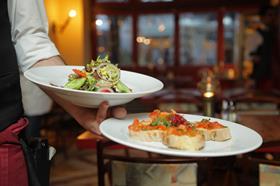
A new online service could offer a boost to sales of vegetables in restaurants by identifying those that have the widest variety of non-meat dishes on their menus.
More Than Carrots has been set up to help vegetarians and so-called ‘meat reducers’ find restaurants with a greater selection of non-meat options. It is being pitched as a veggie-focused restaurant guide for meat eaters, ranking restaurants according to how likely it is that a meat eater will be tempted by their meat-free selection.
Launched this month, the site features an online league table of restaurants which are scored to three levels – green, meaning ‘great meat-free choice and variety’; orange, which means ‘good options, but fewer of them’; and red, which signifies ‘avoid for veggie, limited choice that won’t tempt a meat eater’.
Currently some 795 restaurants across London feature on the site, and the founders hope to add more and expand across the country in the coming months. Users are able to click through to OpenTable directly from the site to make a reservation.
The launch of the free online tool comes alongside new research commissioned by More Than Carrots showing that over half (51 per cent) of UK meat reducers adopted their new diet in the last six months, while only 22 per cent of vegetarians and 28 per cent of vegans made their switch in the same timeframe. That indicates a growing proportion of people looking to eat less meat for health, environmental and animal welfare reasons as negative stories surrounding meat eating filter through the media. A quarter of meat eaters are specifically removing meat from their diet due to concerns about their carbon footprint.
The opportunity to get more vegetables on restaurant menus would appear to be immense. Some 22 per cent of the 2,006 Brits surveyed disagreed that restaurants make it easier for diners to eat less meet, with as many as 73 per cent having avoided a restaurant, or would do so, due to its lack of meat options.
Annette Burgard, founder of More Than Carrots, said: “Climate change is at a tipping point and a lot of people are beginning to realise the enormous impact that reducing meat in their diet can have on the environment. Eating less meat is the one action every one of us can take every day and that is 100 per cent in our control. However, we have found that people struggle, especially at restaurants.
“We have compiled this list by using an algorithm to analyse and score restaurant menus reliably and at scale. Our criteria are based on research from third-party studies and our own qualitative analysis of meat-reducers’ behaviour.”
Constantine Sandis, a professor of philosophy and author of The Things We Do and Why We Do Them, added that dining out can make it difficult for people to avoid eating meat, particularly when in a group of meat eaters. “However, when a decent variety of vegetarian and veg options is available, this normalises opting out of meat and makes it easier for people to do so.”
And Food Foundation chief executive Anna Taylor said restaurants can help improve people’s diets, as well as boost the fresh produce industry. “There is a growing demand for more vegetables and less meat among UK consumers, mainly due to an increasing awareness of the benefits to both our health and the environment. The eating-out-of-home sector plays a critical role in making delicious tasty dishes full of vegetables as accessible as possible and enabling people to achieve their health-related and environmental goals.”



